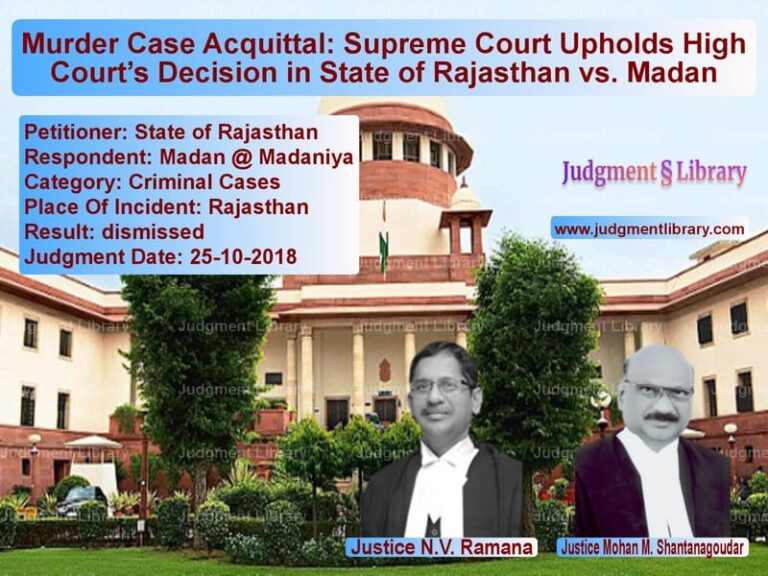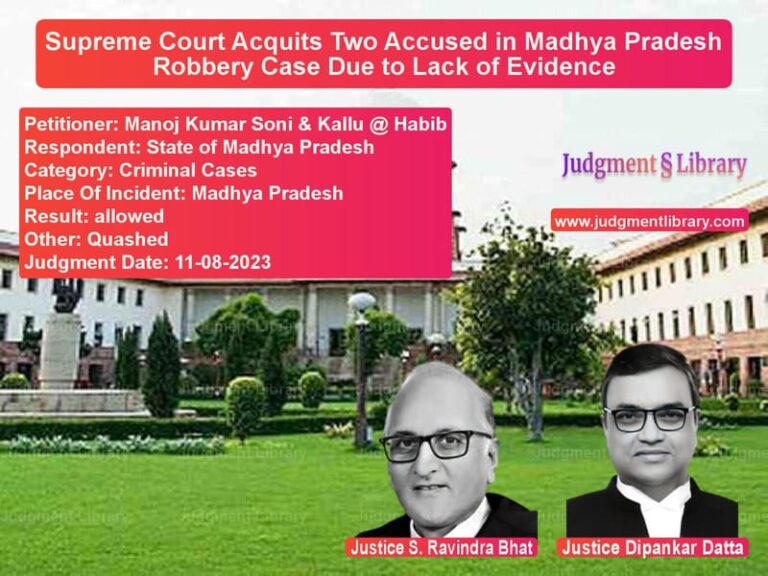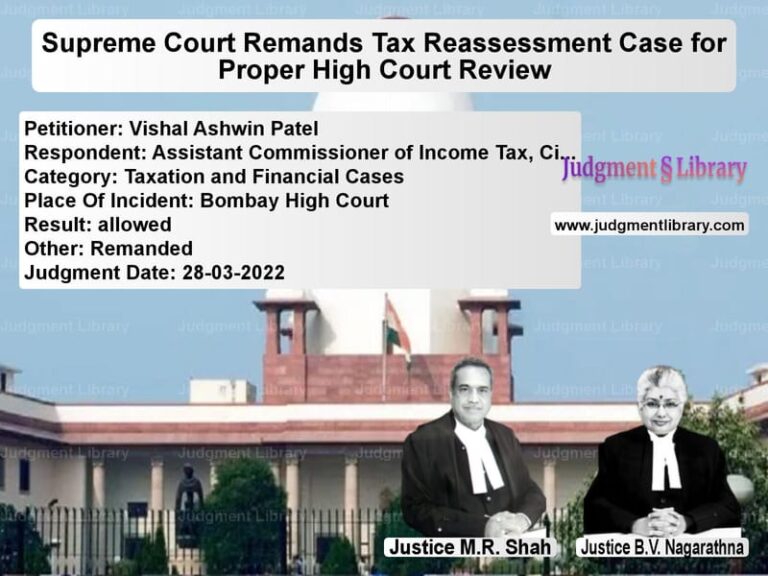Arbitrability of Lease Disputes: Supreme Court’s Ruling on Landlord-Tenant Arbitration
The case of Suresh Shah vs. Hipad Technology India Private Limited revolved around whether disputes arising from a lease agreement could be resolved through arbitration or required adjudication by civil courts. This ruling by the Supreme Court of India provides a crucial clarification on the arbitrability of landlord-tenant disputes under the Transfer of Property Act, 1882 and the Arbitration and Conciliation Act, 1996.
The case originated from a sub-lease agreement between the parties concerning a property in NOIDA, Uttar Pradesh. The petitioner, Suresh Shah, invoked the arbitration clause in the sub-lease agreement and sought the appointment of a sole arbitrator. However, the respondent, Hipad Technology India Pvt. Ltd., did not respond to the arbitration notice, leading to the petitioner approaching the Supreme Court under Section 11(5) of the Arbitration and Conciliation Act, 1996.
Background of the Case
- The petitioner, Suresh Shah, was the long-term leaseholder of the property, having obtained the rights under a Transfer Memorandum dated 13.04.2011.
- On 14.11.2018, he sub-leased the property to the respondent, Hipad Technology India Pvt. Ltd.
- The sub-lease agreement included an arbitration clause stating that any disputes would be resolved through arbitration, with the venue being New Delhi.
- When a dispute arose, the petitioner issued a notice on 11.12.2019 invoking the arbitration clause and nominating Justice (Retired) Mukul Mudgal as the sole arbitrator.
- The respondent did not respond to the notice, prompting the petitioner to seek the Supreme Court’s intervention under Section 11(5) of the Arbitration Act for the appointment of an arbitrator.
Petitioner’s Argument
The petitioner, Suresh Shah, contended that:
- The lease agreement explicitly provided for arbitration as the method of dispute resolution.
- Despite issuing a notice for arbitration, the respondent failed to respond, necessitating judicial intervention.
- Since the lease was governed by the Transfer of Property Act, 1882, and not any special rent control statute, the dispute was arbitrable.
- The Supreme Court had the jurisdiction to appoint an arbitrator since the petitioner was a Kenyan national and the matter qualified as an International Commercial Arbitration under Section 2(f) of the Arbitration Act.
Respondent’s Argument
The respondent, Hipad Technology India Pvt. Ltd., did not file any response or appear before the Supreme Court.
Supreme Court’s Key Findings
The Supreme Court, in its judgment delivered by Chief Justice S.A. Bobde, along with Justices A.S. Bopanna and V. Ramasubramanian, analyzed two main issues:
1. Arbitrability of Lease Disputes
The Court examined whether disputes arising from lease agreements governed by the Transfer of Property Act, 1882 could be resolved through arbitration. The Court referred to key precedents, including:
- Booz Allen & Hamilton Inc. vs. SBI Home Finance Ltd. (2011) – Arbitration tribunals can decide civil and commercial disputes unless specifically barred.
- Himangni Enterprises vs. Kamaljeet Singh Ahluwalia (2017) – Held that tenancy disputes under the Delhi Rent Act were non-arbitrable.
- Vidya Drolia vs. Durga Trading Corporation (2019) – Distinguished between tenancies governed by rent control laws and those governed by the Transfer of Property Act.
The Court ruled that:
- Disputes under the Transfer of Property Act, 1882, where tenants do not enjoy statutory protection, are arbitrable.
- Only disputes under special rent control statutes, which provide statutory protections to tenants, are non-arbitrable.
- The landlord-tenant relationship in this case did not fall under any rent control legislation, making arbitration a valid dispute resolution mechanism.
2. Jurisdiction of the Supreme Court
The Court noted that:
- The arbitration clause in the lease agreement mentioned that disputes should be referred to the High Court of Delhi for arbitrator appointment.
- However, since the petitioner was a Kenyan citizen, the dispute qualified as an International Commercial Arbitration under Section 2(f) of the Arbitration and Conciliation Act, 1996.
- Under Section 11(6) of the Act, the Supreme Court, not the High Court, had jurisdiction to appoint the arbitrator.
Supreme Court’s Judgment
The Supreme Court ruled:
- Justice (Retired) Mukul Mudgal was appointed as the sole arbitrator to resolve the dispute.
- The arbitral proceedings would be conducted as per the Fourth Schedule of the Arbitration Act.
- The case reaffirmed that landlord-tenant disputes under the Transfer of Property Act (and not under rent control laws) are arbitrable.
- The Supreme Court has jurisdiction over international commercial arbitrations even if a contract specifies a High Court for arbitrator appointment.
Key Observations from the Judgment
The Court emphasized:
“If the special statutes do not apply to the premises/property and the lease/tenancy created thereunder as on the date when the cause of action arises, the dispute is arbitrable.”
Additionally, the Court clarified that:
- Eviction disputes governed by special rent control laws are non-arbitrable.
- Landlord-tenant disputes under the Transfer of Property Act do not have statutory protections preventing arbitration.
- Even in arbitration, a tenant can seek relief under Sections 114 and 114A of the Transfer of Property Act regarding forfeiture.
Final Implications of the Judgment
This ruling has significant implications:
- Landlord-tenant disputes under the Transfer of Property Act are arbitrable.
- Only rent-controlled tenancies enjoy protection from arbitration.
- In international commercial arbitration, the Supreme Court has jurisdiction to appoint an arbitrator.
- Arbitration agreements in lease contracts are enforceable unless statutory provisions explicitly override them.
This judgment strengthens the enforcement of arbitration agreements in commercial lease disputes, ensuring that parties can resolve conflicts efficiently without lengthy court battles.
Petitioner Name: Suresh Shah.Respondent Name: Hipad Technology India Private Limited.Judgment By: Justice S.A. Bobde, Justice A.S. Bopanna, Justice V. Ramasubramanian.Place Of Incident: NOIDA, Uttar Pradesh.Judgment Date: 18-12-2020.
Don’t miss out on the full details! Download the complete judgment in PDF format below and gain valuable insights instantly!
Download Judgment: Suresh Shah vs Hipad Technology Ind Supreme Court of India Judgment Dated 18-12-2020.pdf
Direct Downlaod Judgment: Direct downlaod this Judgment
See all petitions in Arbitration Act
See all petitions in Dispute Resolution Mechanisms
See all petitions in Enforcement of Awards
See all petitions in Institutional Arbitration
See all petitions in Judgment by S. A. Bobde
See all petitions in Judgment by A. S. Bopanna
See all petitions in Judgment by V. Ramasubramanian
See all petitions in allowed
See all petitions in supreme court of India judgments December 2020
See all petitions in 2020 judgments
See all posts in Arbitration and Alternate Dispute Resolution Category
See all allowed petitions in Arbitration and Alternate Dispute Resolution Category
See all Dismissed petitions in Arbitration and Alternate Dispute Resolution Category
See all partially allowed petitions in Arbitration and Alternate Dispute Resolution Category







